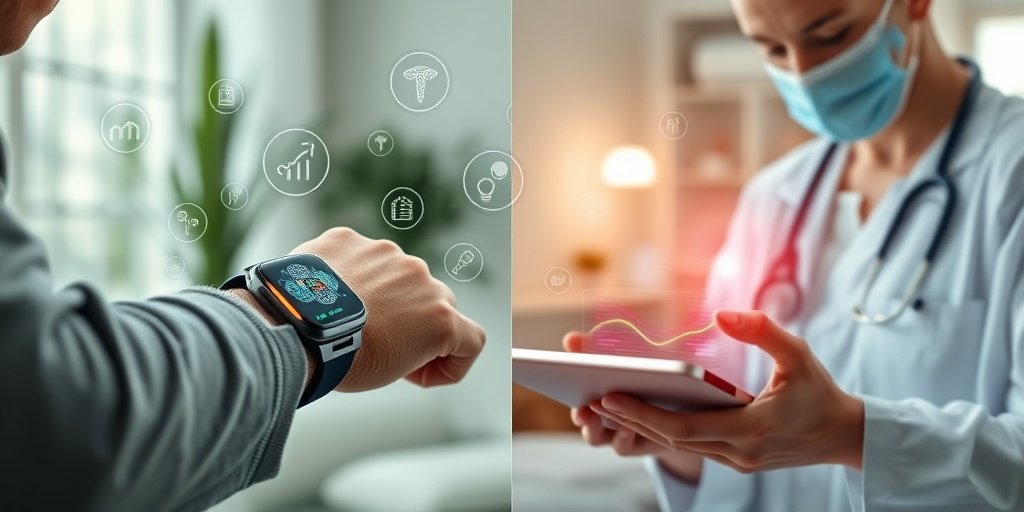⚡ Quick Summary
This review highlights the transformative potential of artificial intelligence (AI) in stroke management, utilizing multimodal sensor data from devices like smartwatches and smartphones. By enabling scalable monitoring and early detection, AI-driven technologies can significantly improve stroke prevention and rehabilitation outcomes.
🔍 Key Details
- 📊 Focus: AI-driven stroke management using multimodal sensor data
- 🧩 Technologies: Smartwatches, smartphones, wearable sensors, ambient home-based technologies
- ⚙️ Applications: Stroke prevention, early detection, personalized rehabilitation
- 🏆 Innovations: AI algorithms for real-time triage and remote monitoring
🔑 Key Takeaways
- 🌐 AI technologies are emerging as critical tools in the stroke care continuum.
- 📈 Scalable monitoring of cardiometabolic and stroke-specific risk factors is now possible.
- 🔍 Early detection of neurological impairments can be achieved through AI algorithms.
- 🏥 Personalized rehabilitation can be delivered remotely, enhancing patient access to care.
- 🚀 Innovations in AI are still in early development but show great promise for future applications.
- 💡 This paradigm shift aims to make stroke care more accessible and individualized.

📚 Background
Stroke remains a leading cause of long-term disability worldwide, with delays in diagnosis and treatment often resulting in poor outcomes. Traditional methods of stroke care face numerous barriers, including limited access to timely detection and rehabilitation services. The integration of artificial intelligence into stroke management presents a unique opportunity to bridge these gaps, offering innovative solutions that can enhance patient care.
🗒️ Study
This review examines the role of AI-powered devices in stroke management, focusing on their ability to utilize multimodal sensor data for improved patient outcomes. The authors discuss various technologies, including smartwatches and wearable sensors, that can monitor vital health metrics and detect early signs of stroke, thereby facilitating timely intervention.
📈 Results
The findings indicate that AI algorithms can effectively analyze data from multiple sources to identify subtle neurological changes. This capability supports real-time triage, allowing healthcare providers to respond more swiftly to potential stroke cases. Furthermore, AI-enhanced remote monitoring systems are paving the way for personalized rehabilitation strategies that can be implemented outside of traditional healthcare settings.
🌍 Impact and Implications
The implications of this research are profound. By leveraging AI technologies, we can create a more efficient and effective stroke care continuum that prioritizes early detection and personalized treatment. This shift not only has the potential to reduce the burden of stroke-related disabilities but also to enhance the overall quality of life for patients. Imagine a future where stroke care is accessible, timely, and tailored to individual needs! 🌟
🔮 Conclusion
The integration of artificial intelligence into stroke management represents a significant advancement in healthcare. As these technologies continue to evolve, they promise to transform how we approach stroke prevention, detection, and rehabilitation. Continued research and development in this area are essential to fully realize the potential of AI in improving patient outcomes and making stroke care more accessible for everyone.
💬 Your comments
What are your thoughts on the role of AI in stroke management? We would love to hear your insights! 💬 Join the conversation in the comments below or connect with us on social media:
Distributed Precision Stroke Care: Artificial Intelligence-Driven Stroke Management Using Multimodal Sensor Data.
Abstract
Delays in stroke diagnosis contribute to long-term disability. Many patients still face barriers to effective risk factor management, timely detection, and access to poststroke rehabilitation. The emergence of artificial intelligence-enabled, consumer-facing health technologies offers a transformative opportunity to address these gaps across the stroke care continuum. This review examines the evolving role of artificial intelligence-powered devices, including smartwatches, smartphones, wearable sensors, and ambient home-based technologies, in enabling precision stroke care. In stroke prevention, these tools facilitate scalable monitoring of cardiometabolic and stroke-specific risk factors. For early detection, artificial intelligence algorithms applied to multimodal sensor data can identify subtle neurological impairments and support real-time triage. In recovery, artificial intelligence-enhanced remote monitoring and virtual supervision offer scalable models for delivering personalized rehabilitation outside of specialized centers. Although most of these innovations remain in early development, they signal a paradigm shift toward accessible, individualized, and data-driven stroke prevention and management.
Author: [‘Pedroso AF’, ‘Schwamm LH’, ‘Khera R’]
Journal: Stroke
Citation: Pedroso AF, et al. Distributed Precision Stroke Care: Artificial Intelligence-Driven Stroke Management Using Multimodal Sensor Data. Distributed Precision Stroke Care: Artificial Intelligence-Driven Stroke Management Using Multimodal Sensor Data. 2025; (unknown volume):(unknown pages). doi: 10.1161/STROKEAHA.125.050447